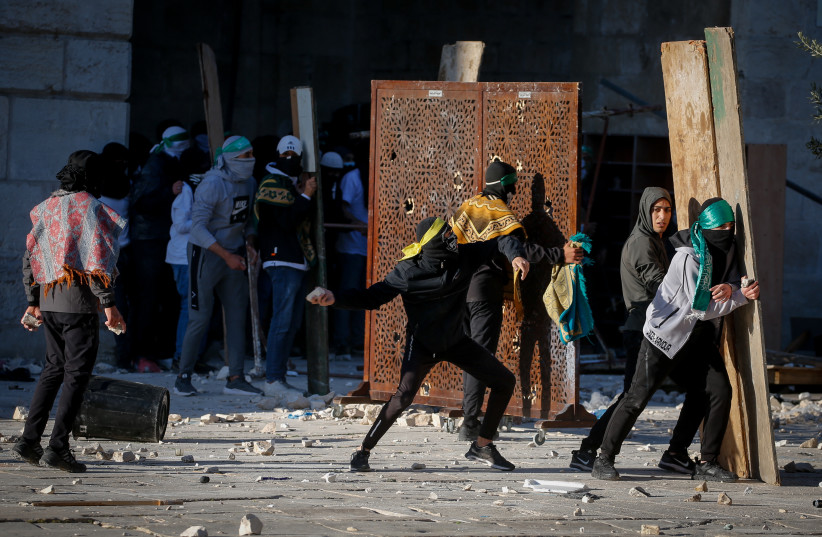Hamas has once again emerged as a major player in events taking place in Jerusalem and the West Bank.
Since last year’s war with Israel, Hamas has sought to portray itself as the sole “defender of Jerusalem and the Islamic holy sites.”
It has also been working hard to prove that the recent wave of terror attacks in Israel and in Jerusalem and the West Bank are the direct result of Hamas’s daily calls for stepping up the “resistance” against Israel.
At the same time, Hamas has been keen to ensure that the violence does not spread to the Gaza Strip.
Although Hamas officials on Saturday denied reaching a deal with Israel to prevent an all-out confrontation following Friday’s riots at the Al-Aqsa Mosque compound (the Temple Mount), they nevertheless confirmed that they had held indirect negotiations with the Israeli government over the past few days.

If true, these contacts show that the mediators consider Hamas an influential actor in the Palestinian arena.
On Thursday night, senior Hamas official Saleh al-Arouri claimed that Israel had assured his group that it would not allow Jews to conduct the “animal sacrifice” in the courtyards of the mosque.
Arouri said, however, that despite the alleged undertaking, which was reportedly relayed through Egypt, Qatar and other parties, Hamas does not trust Israel. He called on the Palestinians to remain in a state of high alert “to defend
Al-Aqsa Mosque and Jerusalem.”
Hours after Arouri’s statements, Hamas supporters gathered at the site and began preparations for thwarting purported attempts by Jews to “storm into al-Aqsa Mosque.”
As part of the preparations, Hamas supporters brought stones, iron bars and fireworks into the mosque. They were joined by dozens of men who are not necessarily affiliated with Hamas.
After the clashes began, Hamas leader Ismail Haniyeh, who is based in Qatar, found himself at the center of a flurry of diplomatic activity to avert another war with Israel.
After holding a series of phone calls with senior Egyptian intelligence officials, Haniyeh was contacted by the United Nations Special Coordinator for the Middle East Peace Process Tor Wennesland and Qatari Foreign Minister Mohammed bin Abdulrahman Al-Thani.
By midday Saturday, it was unclear whether the Palestinian Authority had played a significant role, if any, in these discussions.
According to some reports, Haniyeh presented to the mediators Hamas’s “conditions” for easing the tensions.
These included allowing free access for Muslim worshipers to al-Aqsa Mosque compound, ending the “animal sacrifice” ritual and Israeli “killings and assassinations” in the West Bank, and releasing the Palestinians who were arrested by the Israeli security forces earlier in the day.
The release of several detainees late Friday and the reopening of the al-Jalama checkpoint to Israeli Arabs wishing to enter Jenin on Saturday sparked rumors that Israel and Hamas have reached a new truce agreement.
But several Hamas officials were quick to deny the rumors in an apparent attempt to avoid being accused by Palestinians of making concessions on Jerusalem and the al-Aqsa Mosque.
Zaher Jabareen, a member of the Hamas politburo, said that the reports in the Arab and Israeli media concerning a truce agreement were baseless and untrue.
“The obstacles of the occupation won’t deter us from defending Jerusalem and the Aqsa Mosque against its ongoing terrorism and the extremist settlers,” Jabareen said in a statement. “Our people and their resistance will always remain ready to defend Jerusalem and the mosque.”
Another senior Hamas official, Izzat al-Risheq, said in separate remarks that his group’s message to all the mediators was clear, namely that “Jerusalem and al-Aqsa Mosque are a red line.”
Risheq too claimed that a number of countries and the UN communicated with Hamas because they “feared an escalation of the situation during the holy month of Ramadan due to the occupation’s violations and ongoing crimes in Jerusalem and the Aqsa Mosque.”
The Hamas official added: “Our message to the mediators was that any provocation against our people and their holy sites will be met with confrontation, and that although we do not seek a new war, the resistance [factions] in the Gaza Strip are following all developments and their finger is on the trigger.”
Even if the reports and rumors about a new truce deal are inaccurate or false, what is certain is that Hamas has once again shown that there is no ignoring its role in events taking place in Jerusalem and the West Bank.
Hamas is convinced that the 2021 war with Israel forced the Israeli government to abandon plans to evict a number of Palestinian families from their homes in the east Jerusalem neighborhood of Sheikh Jarrah.
Now, Hamas wants the Palestinian public to believe that its threats over the past few days also forced Israel to make concessions to the Palestinians in Jerusalem and the West Bank.
In a message directed to the Palestinians on Friday, Haniyeh sought to demonstrate that Hamas holds the key to both peace and war. He also strove to bolster Hamas’s image as the only party capable of defending Jerusalem and al-Aqsa Mosque.
“We, the Palestinian people and the Islamic nation are the ones who decide,” Haniyeh said. “And our decision is to defend and protect the blessed Aqsa Mosque at all costs.”
